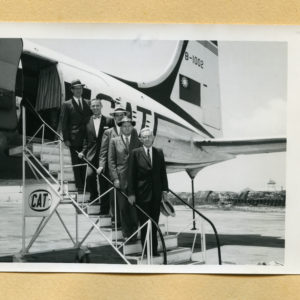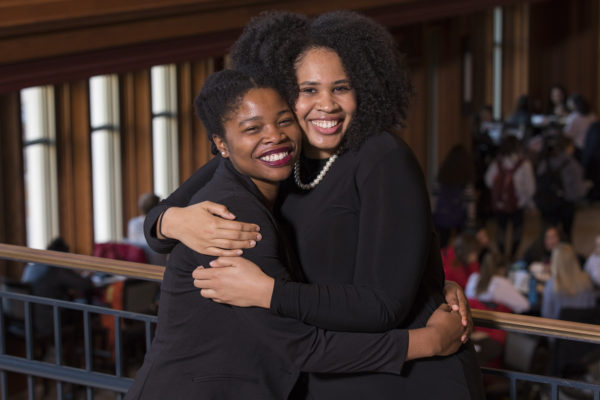Sometime in the early autumn of 1985, Peter J. Aranda III got the message: The organization that made it possible for him to attend business school at Washington University did more than hand out scholarship money.
That was the day Leroy Nunery, a 1979 WashU MBA and an early recipient of a fellowship from The Consortium for Graduate Study in Management, returned to campus and “kicked us in the butt.”
“He would come back with some frequency, giving us insight on what we would need to do to succeed,” says Aranda, MBA ’87, who had just become a consortium fellow. As members of an underrepresented minority group, Nunery told Aranda and his consortium classmates, “You need to represent.”
At the time, the consortium, founded at Washington University in 1966 to increase diversity in business education and corporate leadership, was a network of nine top MBA programs across the country.
Aranda came to realize the consortium’s biggest value was its community: a support network for fellows across every consortium school and a connection with recruiters eager to meet talented African-American, Hispanic American and Native American students in their pursuit of an inclusive workforce.
Today, Aranda preaches those values as the consortium’s executive director and CEO. As a consortium student, volunteer, alumnus and now its leader, he’s seen the consortium expand to 19 member schools — Rice University just joined in July 2017 — and grow to include more than 9,000 alumni.
And Nunery, a Philadelphia-based management consultant, has never forgotten the thrill of learning he’d be a consortium fellow.
“I think about the day I got my letter,” Nunery says. “To get that letter saying you have been awarded this opportunity just meant a lot to me. It wasn’t a donation. It was something I had earned — and something I had to prove.”

When Nunery started business school as a consortium fellow, the organization still made its headquarters on the campus where management Professor Sterling H. Schoen had founded it 11 years earlier. In the early 1960s, doing postdoctoral work in Chicago, Schoen’s research gave him a startling epiphany: the Fortune 500 employed zero African Americans in management.
Schoen explained his vision in a 1996 letter to a University of Michigan colleague. He recalled “witnessing the burning of Chicago” and Saul Alinsky’s call for activism in the cause of civil rights.
“It was there that I first conceived of the notion that our business schools might take a more active and constructive role in promoting equal opportunity employment,” the late-Schoen wrote. “Washington University by itself could make little impact on the problem, and so the idea of a consortium of leading universities was conceived.”
By 1964, Schoen had engaged WashU leadership and began two years of planning for an August 1966 “feasibility conference,” where 47 leaders from U.S. corporations, top business schools, nonprofits and government gave his idea the thumbs-up.
Indiana University-Bloomington and the University of Wisconsin-Madison were the first to join WashU as consortium members, recruiting its first class of 21 African-American men in 1967.
Now based in Chesterfield, Missouri, The Consortium for Graduate Study in Management is a $30 million, independent nonprofit that funnels millions in merit-based fellowship support annually to MBA prospects attending its 19 member schools. Originally focused on serving African-American men, consortium membership is now open to any U.S. citizen or permanent resident who can show a “demonstrated commitment” to its mission of diversity and inclusion.
Before dispersing to their respective business schools each fall, every consortium class convenes in early June at the annual Orientation Program & Career Forum (OP), an intense five-day series of preparation workshops, community-building sessions and networking events. The consortium has hosted “OP” at Washington University 13 times and nine other times in the St. Louis area, including in 2016 when it featured a 50th-anniversary reception in Knight Hall.
The consortium now recruits more than 470 students a year as members and MBA prospects. Its first annual report in 1968 listed 27 corporate partners. Today, nearly 80 companies — including General Mills and 3M, the only companies to be partners for each of the consortium’s 51 years — provide financial support in exchange for early access to the consortium’s pipeline of talented MBA students.
Based on Aranda’s research, the consortium is fulfilling its mission. From 2003 to 2010 — the last time he could find comparable statistics — consortium-affiliated MBA programs increased their share of underrepresented minorities nearly 30 percent, compared to a decline of about 8.3 percent at non-consortium programs.
In the top 50 domestic MBA programs, about 8 percent of students, about 800, were African American, Hispanic American or Native American. Aranda notes that about half of the underrepresented minorities in top business schools come through the consortium.
The consortium’s influence on inclusivity in business school and corporate leadership is what drove Nunery to return over and over to the Washington University campus.
“It was my obligation to come back and communicate that this wasn’t just about going to school for business,” says Nunery, who also serves on the university’s Gephardt Institute for Civic and Community Engagement National Council and as a member of the Eliot Society. “It’s about shaping a society based on your presence.”




